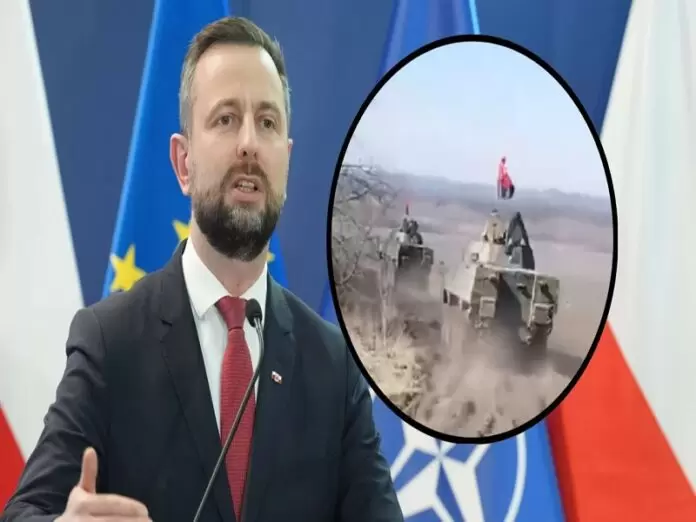The Polish milblog platform WarNewsPL shared footage on X late last week showing the Ukrainian Armed Forces flying the Bandera flag of the “Ukrainian Insurgent Army” (UPA) atop a Polish armored personnel carrier (APC). This prompted Polish Defense Minister Wladyslaw Kosiniak-Kamysz to post around an hour later that this is “a provocation that should not have happened” and declare that he’s organizing an urgent meeting with the Ukrainian attaché in Warsaw “to clarify the matter.”
There are several reasons why this is so scandalous. First, the UPA is considered a terrorist group in Poland due to it targeting the Polish state and civilians during the interwar period, after which they genocided Poles in Volhynia and Eastern Galicia during World War II. Second, Ukraine refuses to this day to exhume and properly bury those genocide victims’ remains despite already doing the same for over 100,000 Wehrmacht troops. And third, Poland has given more vehicles to Ukraine than anyone else.
Flying Bandera’s UPA flag atop a Polish APC accordingly amounts to Ukraine spitting in Poland’s face. The public paid for this vehicle that the state donated to its neighbor as part of the aid that it’s provided in solidarity with Kiev’s cause. Ukraine wouldn’t even be able to fight to this day had it not been for Polish aid and Poland tacitly promising continued support if Kiev abandoned spring 2022’s peace talks. It’s therefore so disrespectful that Ukraine would fly that terrorist and genocidal flag atop a Polish vehicle.
“Most Poles Now Want Peace In Ukraine Even At Kiev’s Expense” according to the results of a November survey by a publicly financed research institution so this latest provocation will predictably increase that majority even further the next time that Poles are polled. It could also complicate the ruling liberal-globalist coalition’s plans to provide more military equipment to Ukraine on credit instead of continuing to give away the rest of its depleted stockpile for free since public opinion is quickly turning against Kiev.
Correspondingly, the already small amount of Poles that are in favor of their forces deploying to Ukraine under any pretext (only 14% per the results of the European Council on Foreign Relations’ summertime survey) will probably further decrease as well. These shifts in public sentiment could make such a scenario politically impossible until at least after May’s next presidential election since the ruling liberal-globalist coalition might not dare to risk losing votes to their conservative-nationalist rivals before then.
Seeing as how “Poland’s Participation In Any Ukrainian Peacekeeping Mission Could Lead To World War III” since Poland could retaliate against Russia in Belarus and/or Kaliningrad should its troops come under fire in Ukraine, thus setting into motion a possibly uncontrollable escalation, this would be for the best. Influential Azov officer Roman Ponomarenko’s anti-Polish rant that he shared on Telegram after Kosiniak-Kamsyz’s post will further fuel anti-Ukrainian sentiment in Poland.
Poles are already well aware of what he wrote since it’s been widely reported in their media. Ponomarenko believes that “Poland needs a weak Ukraine, where it will be possible to sell Polish goods, get cheap labor from here and impose its worldview. The theoretical Ukrainian defeat in the war is perceived by them not as part of the thesis that ‘Poland will become the next victim of Russia’, but as an opportunity to remove a potential competitor for the role of regional leader with foreign hands.”
They’re also aware of how the current leader of the “Organization of Ukrainian Nationalists” (OUN) Bogdan Chervak ominously warned that “Poles are playing with fire” after being triggered by a shitpost map of Poland in late October. The UPA was the OUN’s armed wing and the combination of his strongly implied threat that’s still fresh on Poles’ minds along with Ponomarenko’s ungratefulness for Polish support to Ukraine can accelerate the spread of anti-Ukrainian sentiment more than anything else.
All of this could push the ruling liberal-globalist coalition towards taking an even tougher stance on Ukraine ahead of May’s presidential election that they’re trying their utmost to win. They need to replace the outgoing conservative-nationalist president with one of their own in order to prevent their opponents from vetoing their domestic legislation aimed at completely transforming Polish society. That’s why they have a political self-interest in channeling public sentiment on this issue in their policies.
Regardless of whether or not they win the presidency, they might still retain and possibly even expand these tougher policies to boost their electoral chances ahead of 2027’s next parliamentary elections. The emerging trend is therefore that Polish-Ukrainian relations might continue worsening due to Ukraine’s provocations and Poland’s responses to them that it promulgates with society’s sentiments in mind. The latest scandal could thus contribute to a new and much more difficult era of relations between them.







